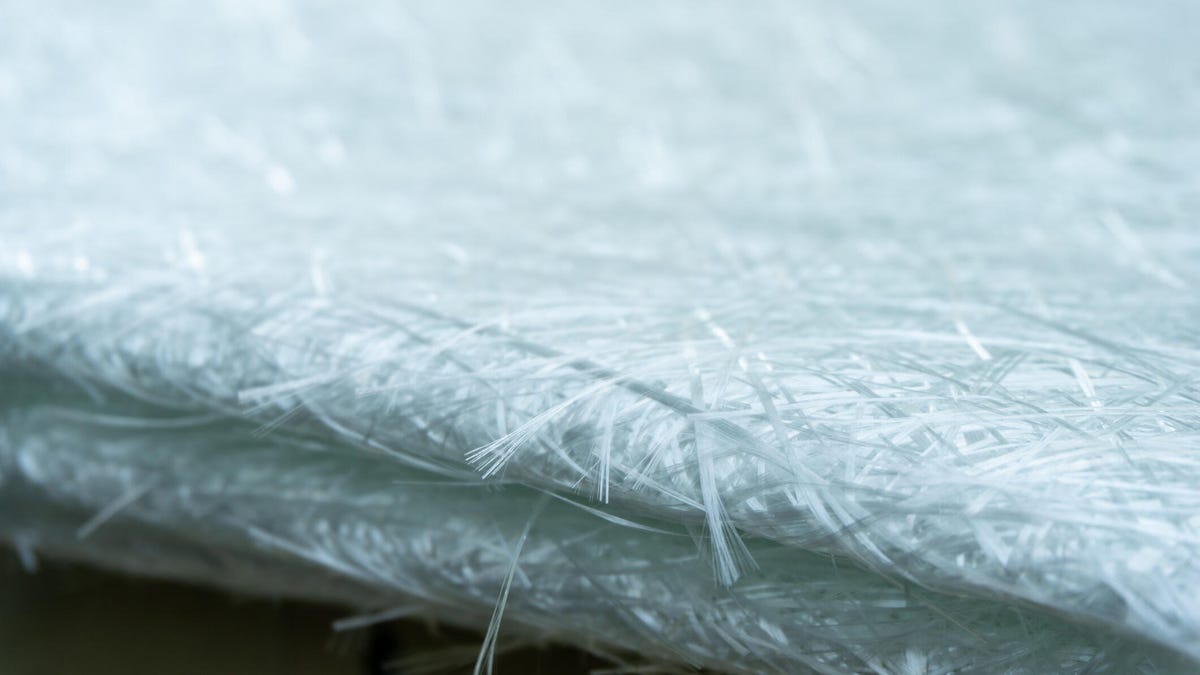There May be Fiberglass in Your Mattress. Should You Be Concerned?
Some mattress manufacturers turn to fiberglass to make their mattresses fire-resistant. That could mean you have a health hazard lurking under your sheets.

Manufacturers have a long history of making swaps only when push comes to shove. And mattress production is no exception. Finally, mattress manufacturers stopped putting fire-retardant chemicals in mattresses that were known contributors to cancer risk.
But since mattresses legally have to be fire-resistant, some mattress producers turned to a surprising replacement: fiberglass.
Is fiberglass dangerous? Not inherently, no. But in your mattress, it could spell trouble. Let's look at why -- and how you can find out which mattresses contain fiberglass.
What is fiberglass?
Fiberglass is cheap, versatile, lightweight, heat-resistant, long-lasting and more. In short, it has a long list of properties that make it a popular material for use in everything from airplanes to waterslides -- and, apparently, mattresses.
Manufacturers make fiberglass by melting down minerals like silica sand and putting the liquid through a process called pultrusion. The resulting glass fibers are then bundled and woven together to make fiberglass.
So is fiberglass dangerous? Not the product itself. The issue comes when it breaks down. Smaller fiberglass particles can get into your eyes or airways and irritate your skin. And therein lies the potential problem when you buy a mattress with fiberglass.
Why do they put fiberglass in mattresses?
Fiberglass is a fire-resistant material that's cheap and easy to produce. So it seemed like a perfect solution when mattress manufacturers needed to move away from hazardous fire-retardant chemicals.
To meet the nationwide mattress flammability standards, some manufacturers started adding an inner layer of fiberglass. You'll generally see this only if you take your mattress cover off. Still, the stiff glass fibers can break off and migrate. Even a small tear in the mattress cover could mean them escaping.
The issue is serious enough that California has legislation in the works to ban mattresses containing fiberglass. If passed, it won't go into effect until 2027.
Should you be concerned about fiberglass?
When mattresses contain fiberglass, but the fiberglass is safely confined within the mattress cover, it doesn't pose a serious health risk. But if the cover rips or you remove it for cleaning, it can release tiny fiberglass particles into the air and surrounding area.
Symptoms of fiberglass exposure include:
- Eye redness and irritation
- A skin rash
- A sore nose and/or throat (if inhaled)
- Flaring of asthma or bronchitis
- Stomach irritation (if swallowed)
The good news: all of these symptoms should be short-lived, provided you can put the fiberglass exposure to a stop. Adding another mattress cover can often be enough.
5 ways to know if there is fiberglass in your mattress
If you're wondering if there's fiberglass in your mattress, you have a few ways to check. You can tell if mattresses contain fiberglass if:
Your mattress label says so
Look at the label on your mattress. Fiberglass might also be listed:
- Glass fiber
- Glass wool
- Glass-reinforced plastic
- Glass-fiber reinforced plastic
- Fiberglass-reinforced plastic
Really, you should keep your eyes peeled for the word "glass" as you look at your mattress label. If you're not sure if you have a mattress with fiberglass, you can also do your research on the manufacturer's website or contact them directly.
All of this said, the California Department of Public Health (CDPH) points out that some mattresses with fiberglass don't list it on the label. The CDPH also reminds consumers that even if you see a CertiPUR-US® certification on your mattress, it doesn't mean it's fiberglass-free. That certification only looks at the actual foam of the mattress, not its other components.
Your mattress isn't organic
Organic mattresses have to be made with organic materials or materials specifically approved for organic mattress use -- and fiberglass didn't make the cut.
As a result, you won't find this man-made material in any of the best organic mattresses. Instead, they use naturally occurring materials. Avocado mattresses, for example, are made with materials like wool and natural latex.
Your mattress wasn't made in the US
Different countries have different manufacturing standards. While the US hasn't yet banned fiberglass in mattresses, it does have fairly stringent requirements when it comes to mattress production and materials.
Mattresses made in other countries with laxer regulations are more likely to include fiberglass. That's not to say all foreign-made mattresses are risky, but you should do thorough research before buying one that's not manufactured domestically.
Your mattress has complaints
The United States Consumer Product Safety Commission runs a website that lets consumers research potentially unsafe products. You can type the name of your mattress into the "Search for unsafe products" bar to see if anyone else has submitted complaints about fiberglass in your mattress. This can also be a helpful tool when you're shopping for a new mattress.
Your mattress was cheap
As we mentioned earlier, fiberglass is cheap to make. As a result, it's a budget solution that a lot of mattress manufacturers use to meet mattress flammability standards. The cheaper your mattress, the more likely it is that it was made with low-cost materials like fiberglass.
Final thoughts
If you already own a mattress with fiberglass, your best bet is to keep it in its original mattress cover. If you're someone who likes to be able to clean the outer layer of your mattress -- or you just want an extra layer of protection -- add a mattress protector into the mix.
If you're shopping for a new bed and you want to avoid fiberglass in your mattress, do your research. The best mattresses on the market today should list their components on their website, but you can always contact the manufacturer if you're unsure. Or if you want to skip the hassle, buy an organic mattress to avoid the fiberglass issue altogether.